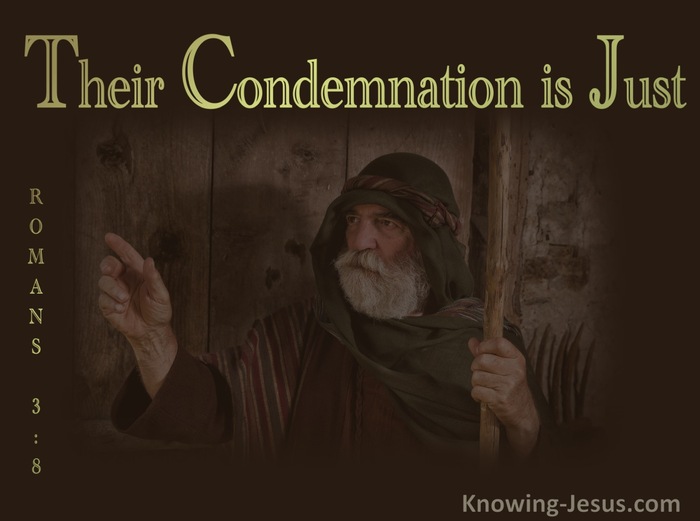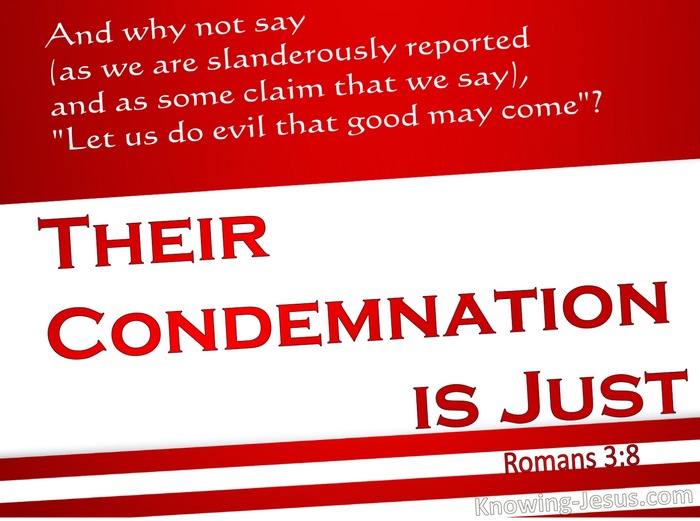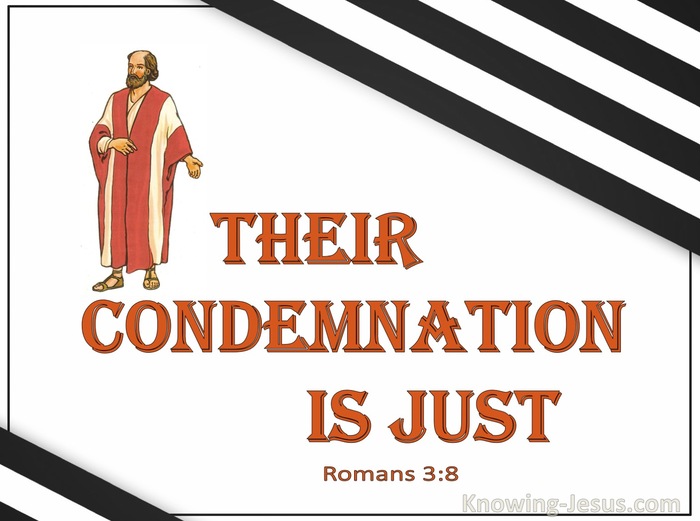Parallel Verses
International Standard Version
Or can we say as some people slander us by claiming that we say "Let's do evil that good may result"? They deserve to be condemned!
New American Standard Bible
And why not say (as we are slanderously reported and as some claim that we say), “
King James Version
And not rather, (as we be slanderously reported, and as some affirm that we say,) Let us do evil, that good may come? whose damnation is just.
Holman Bible
And why not say, just as some people slanderously claim we say, “Let us do what is evil so that good may come”?
A Conservative Version
and not (as we are slandered, and as some affirm us to say) that we may do evil so that good things may come (whose condemnation is just)?
American Standard Version
and why not (as we are slanderously reported, and as some affirm that we say), Let us do evil, that good may come? whose condemnation is just.
Amplified
And why not say, (as some slanderously report and claim that we teach) “Let us do evil so that good may come of it”? Their condemnation [by God] is just.
An Understandable Version
And why should we not say, "Let us do what is wrong so something good will come from it," as some people slanderously claim that we are saying? These people deserve to be condemned.
Anderson New Testament
Then, why not say, (as we are slanderously reported as saying, and, as some affirm, that we do say,) Let us do evil, that good may come? Of such persons the condemnation is just.
Bible in Basic English
Let us not do evil so that good may come (a statement which we are falsely said by some to have made), because such behaviour will have its right punishment.
Common New Testament
Why not say as we are being slanderously reported as saying and as some claim that we say "Let us do evil that good may come"? Their condemnation is just.
Daniel Mace New Testament
and why may we not do evil, that good may come?" which is slanderously reported to be our maxim, by some, whose condemnation is just.
Darby Translation
and not, according as we are injuriously charged, and according as some affirm that we say, Let us practise evil things, that good ones may come? whose judgment is just.
Godbey New Testament
are we not indeed thus traduced, and as some say we speak, that, Let us do evil in order that good may come? whose condemnation is just.
Goodspeed New Testament
And why not say, as people abuse us for saying and charge us with saying, "Let us do evil that good may come out of it"? Such people will be condemned as they deserve!
John Wesley New Testament
And why may we not (as we are slandered, and as some affirm us to say) do evil, that good may come? Whose damnation is just.
Julia Smith Translation
And not, (as we are defamed, and some have declared us to say,) That we should do evil things, that good things might come: whose judgment is just.
King James 2000
And not rather, (as we are slanderously reported, and as some affirm that we say,) Let us do evil, that good may come? whose condemnation is just.
Lexham Expanded Bible
And [why] not (as we are slandered, and as some affirm that we say), "Let us do evil, in order that good may come [of it]? Their condemnation is just!
Modern King James verseion
And not rather, (as we are wrongly accused, and as some affirm that we say), Let us do bad things that good may come? Their condemnation is just.
Modern Spelling Tyndale-Coverdale
And say not rather - as men evil-speak of us, and as some affirm that we say - "Let us do evil, that good may come thereof." Whose damnation is just.
Moffatt New Testament
Why should we not do evil that good may come out of it?" (which is the calumny attributed to me ??the very thing some people declare I say). Such arguments are rightly condemned.
Montgomery New Testament
And why not say (as I myself am slanderously reported to say), "Let us do evil that good may come out of it"? Such arguments are rightly condemned.
NET Bible
And why not say, "Let us do evil so that good may come of it"? -- as some who slander us allege that we say. (Their condemnation is deserved!)
New Heart English Bible
Why not (as we are slanderously reported, and as some affirm that we say), "Let us do evil, that good may come?" Those who say so are justly condemned.
Noyes New Testament
And why do you not say, as some slanderously charge us with saying, Let us do evil, that good may come? The condemnation of such men is just.
Sawyer New Testament
And as we are falsely accused and as some declare that we say, [do we say] Let us do evil that good may come? Whose judgment is just.
The Emphasized Bible
And why not, according as we are injuriously charged, and according as some affirm that we say, Let us do the bad things, that the good ones may come? whose sentence is, just.
Thomas Haweis New Testament
And why not admit, (as we are falsely reported of; and as some affirm we say,) That we should do evil things, that good may come? whose condemnation is just.
Twentieth Century New Testament
Why should we not say-as some people slanderously assert that we do say-'Let us do evil that good may come'? The condemnation of such men is indeed just!
Webster
And not rather (as we are slanderously reported, and as some affirm that we say) Let us do evil, that good may come? whose damnation is just.
Weymouth New Testament
And why should we not say--for so they wickedly misrepresent us, and so some charge us with arguing--"Let us do evil that good may come"? The condemnation of those who would so argue is just.
Williams New Testament
Why should we not say, as people abusively say of us, and charge us with actually saying, "Let us do evil that good may come from it"? Their condemnation is just.
World English Bible
Why not (as we are slanderously reported, and as some affirm that we say), "Let us do evil, that good may come?" Those who say so are justly condemned.
Worrell New Testament
And why not (as we are slanderously reported, and as some affirm that we say), "Let us do evil that good may come?" whose condemnation is just.
Worsley New Testament
and why may we not do evil that good may come?"---as we are injuriously charged, and as some affirm that we say; whose condemnation is just.
Youngs Literal Translation
and not, as we are evil spoken of, and as certain affirm us to say -- 'We may do the evil things, that the good ones may come?' whose judgment is righteous.
Themes
false Accusation » Incidents illustrative of » Against paul
Bigotry » Paul's argument against
Topics
Interlinear
me
Tis
Poieo
Kakos
Agathos
Krima
References
Fausets
Hastings
Word Count of 37 Translations in Romans 3:8
Prayers for Romans 3:8
Verse Info
Context Readings
Crowds By The Sea
7 For if through my falsehood God's truthfulness glorifies him even more, why am I still being condemned as a sinner? 8 Or can we say as some people slander us by claiming that we say "Let's do evil that good may result"? They deserve to be condemned! 9 What, then, does this mean? Are we Jews any better off? Not at all! For we have already accused everyone, both Jews and Greeks, of being under the power of sin.
Phrases
Cross References
Romans 6:1
What should we say, then? Should we go on sinning so that grace may increase?
Romans 6:15
What, then, does this mean? Should we go on sinning because we are not under Law but under grace? Of course not!
Matthew 5:11
"How blessed are you whenever people insult you, persecute you, and say all sorts of evil things against you falsely because of me!
Romans 5:20
Now the Law crept in so that the offense would increase. But where sin increased, grace increased even more,
Romans 7:7
What should we say, then? Is the Law sinful? Of course not! In fact, I wouldn't have become aware of sin if it had not been for the Law. I wouldn't have known what it means to covet if the Law had not said, "You must not covet."
1 Peter 3:16-17
But do this gently and respectfully, keeping a clear conscience, so that those who speak evil of your good conduct in the Messiah will be ashamed of slandering you.
Jude 1:4
For some people have slipped in among you unnoticed. They were written about long ago as being deserving of this condemnation because they are ungodly. They turn the grace of our God into uncontrollable lust and deny our only Master and Lord, Jesus the Messiah.





